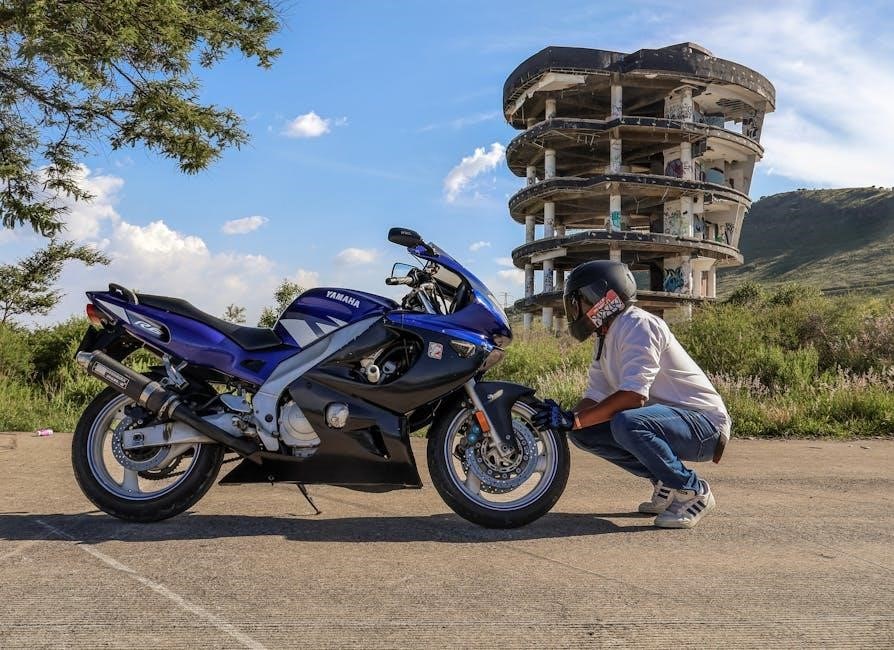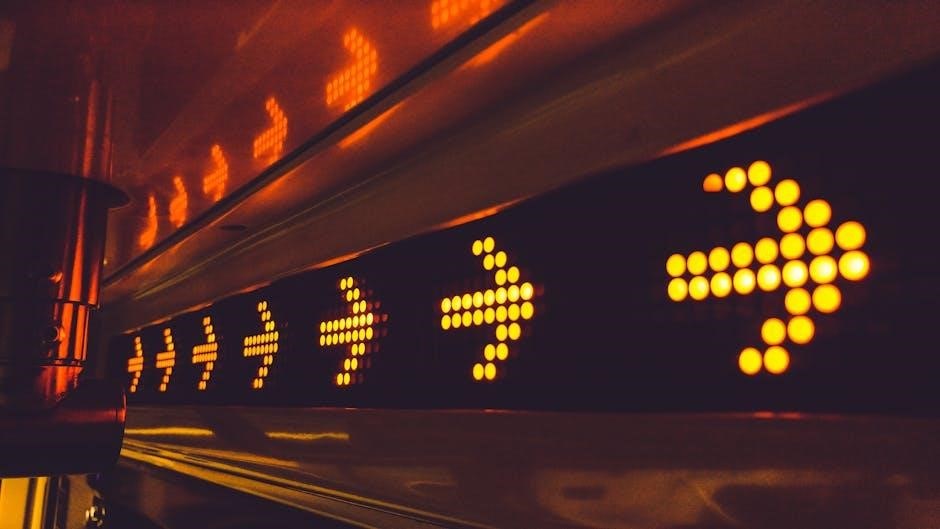The Nissan 370Z is a powerful sports car designed for driving enthusiasts, offering a blend of performance, style, and heritage․ This guide provides essential insights for buyers, covering history, models, maintenance, and ownership costs to help make informed decisions․
1․1 Overview of the Nissan 370Z
The Nissan 370Z is a rear-wheel-drive sports car that combines powerful performance with sleek design․ Introduced in 2008, it features a 3․7-liter V6 engine, producing 332 horsepower and 270 lb-ft of torque․ Available as a coupé or roadster, the 370Z offers a choice of 6-speed manual or 7-speed automatic transmissions․ Its aggressive styling, lightweight chassis, and advanced suspension system deliver a thrilling driving experience․ The 370Z is praised for its responsive handling and robust acceleration, making it a favorite among enthusiasts․ With a focus on driver engagement, it balances everyday usability with track-ready capabilities, appealing to both casual drivers and performance seekers․
1․2 Importance of a Buyer’s Guide for the 370Z
Purchasing a Nissan 370Z can be a significant investment, making a buyer’s guide indispensable․ It helps navigate the complexities of selecting the right model, understanding common issues, and avoiding costly mistakes․ With various trims, special editions, and potential reliability concerns, a guide ensures buyers are well-informed․ It also highlights maintenance tips, performance upgrades, and long-term ownership costs, empowering buyers to make smart decisions․ Whether you’re a seasoned enthusiast or a first-time buyer, a comprehensive guide provides clarity and confidence in your purchase․ Key areas include identifying red flags, understanding market value, and optimizing ownership experiences․
History and Evolution of the Nissan 370Z
The Nissan 370Z debuted in 2008, succeeding the 350Z, with a refined design, enhanced performance, and a larger 3․7L V6 engine, building on its sports car heritage․
2․1 The 370Z as a Successor to the 350Z
The Nissan 370Z debuted in 2008 as the successor to the 350Z, offering enhanced performance and modernized design․ It retained the rear-wheel-drive layout and sporty DNA but introduced a more powerful 3․7L V6 engine, producing 332 horsepower․ The 370Z featured a shorter wheelbase and lighter body for improved agility․ Its design evolved with sharper lines, LED lighting, and a more aggressive stance․ Inside, it boasted upgraded tech, including a refined infotainment system and optional features like a navigation system․ The 370Z aimed to appeal to driving enthusiasts by blending heritage with contemporary advancements, making it a worthy successor to the 350Z․
2․2 Key Design and Performance Upgrades
The Nissan 370Z received significant design and performance upgrades, enhancing its appeal as a modern sports car․ The 2011 refresh introduced a more aggressive front fascia, LED daytime running lights, and revised aerodynamics for improved stability․ Under the hood, the 3․7-liter V6 engine delivered 332 horsepower, paired with a refined 6-speed manual or 7-speed automatic transmission․ The interior was updated with premium materials and advanced technology features․ Suspension tweaks improved handling, while optional 19-inch wheels and sport brakes elevated performance․ These upgrades ensured the 370Z remained competitive, blending power, style, and driving precision for enthusiasts seeking a thrilling experience behind the wheel․
Understanding the Different Models and Variants
The Nissan 370Z is available in coupé and roadster body styles, each offering unique driving experiences․ Special editions and limited-run models add exclusivity and performance enhancements․
3․1 Coupé vs․ Roadster: Key Differences
The Nissan 370Z is available in two distinct body styles: the Coupé and the Roadster․ The Coupé offers a fixed roof, providing a more rigid structure and a sportier, enclosed driving experience․ In contrast, the Roadster features a retractable soft top, ideal for those who enjoy open-air driving․ Both models share the same powerful V6 engine and rear-wheel-drive layout but cater to different preferences․
The Coupé is slightly lighter and offers better handling due to its fixed roof, while the Roadster provides a unique connection to the road with the top down․ Buyers should consider their priorities: performance and handling for the Coupé, or the thrill of open-top driving for the Roadster․

3․2 Special Editions and Limited-Run Models
The Nissan 370Z has been offered in various special editions, enhancing its appeal for enthusiasts․ Models like the 40th Anniversary Edition celebrate the Z-car lineage, featuring unique styling and exclusive features․ Limited-run models, such as the Nismo variant, offer performance upgrades like sport-tuned suspensions and aerodynamic enhancements․ These editions often include distinctive design elements, making them stand out․ Buyers should research these models to find the one that best fits their preferences and driving needs, as they offer a blend of exclusivity and enhanced performance․

Common Issues and Reliability Concerns
The Nissan 370Z may experience engine noise, CVT transmission problems, and sensor-related issues․ Regular maintenance and inspections are crucial to address these concerns early and ensure reliability․
4;1 Engine and Transmission Problems
The Nissan 370Z has faced some engine and transmission issues over the years․ Common problems include excessive oil consumption, overheating, and premature wear on engine components․ The CVT (Continuously Variable Transmission) in some models has been known to experience slipping, hesitation, or failure, particularly under heavy acceleration․ Additionally, there have been reports of grinding noises during reversing, which may indicate issues with the transmission or drivetrain․ A recall related to a faulty hose and sensor-related problems has also been noted․ Buyers should ensure proper maintenance records and consider professional inspections to address these concerns before purchase․
4․2 Electronic and Sensor-Related Issues

Some 370Z owners have reported issues with electronic systems, including cruise control malfunctions and sensor-related errors․ Problems like “Forward driving aids disabled” or “Front sensor blocked” messages have been noted, often due to faulty sensors or software glitches․ Additionally, there have been instances of infotainment system lag and connectivity issues, particularly with Bluetooth and touchscreen responsiveness․ These problems can be frustrating but are typically resolvable with software updates or sensor replacements․ Prospective buyers should check for any recurring electronic issues and ensure all systems are functioning properly before purchase․

Maintenance and Servicing Tips
Regular oil changes, tire rotations, and brake inspections are crucial․ Check sensors and address unusual noises promptly to avoid costly repairs․ DIY maintenance is possible for basic tasks, but professional servicing is recommended for complex systems like transmissions and electronics․
5․1 Recommended Maintenance Schedule
Regular maintenance is crucial for the Nissan 370Z to ensure optimal performance and longevity․ Owners should follow a structured schedule, starting with oil changes every 5,000 to 7,500 miles using synthetic oil․ Tire rotations should occur every 6,000 miles to maintain even wear․ Brake fluid and coolant should be replaced every 30,000 miles, while the timing chain and water pump should be inspected at 60,000 miles․ Spark plugs should be replaced at 105,000 miles․ Additionally, the CVT transmission fluid should be changed every 30,000 miles if equipped․ Adhering to these intervals helps prevent costly repairs and ensures the vehicle runs smoothly for years․

5․2 DIY Maintenance vs․ Professional Servicing
Maintaining a Nissan 370Z can be cost-effective with DIY tasks like oil changes and filter replacements․ However, complex issues like transmission repairs or sensor diagnostics often require professional expertise․ DIY enthusiasts can handle basic maintenance, but specialized tools and knowledge are needed for advanced repairs․ Professional servicing ensures compliance with manufacturer standards and warranties, while DIY can save money but may void warranties if not done correctly․ Balancing both approaches is key to maintaining performance and reliability․ Always consult the owner’s manual or trusted repair guides for guidance․
Performance Upgrades and Modifications
Enhance your 370Z’s capabilities with engine and exhaust upgrades for improved power․ Suspension and brake modifications can refine handling and stopping performance, ensuring a superior driving experience․
6․1 Engine and Exhaust Upgrades
Upgrading the engine and exhaust system can significantly enhance the performance of your Nissan 370Z․ Popular modifications include installing a cold air intake to improve airflow and a cat-back exhaust system to reduce backpressure and amplify the engine’s sound․ For more power, enthusiasts often opt for superchargers or turbochargers, which can boost horsepower and torque․ Tuning the engine with aftermarket ECU software is another effective way to maximize performance․ Additionally, lightweight components like titanium exhausts can reduce weight and improve handling․ Always ensure modifications are done by professionals to maintain reliability and avoid potential damage to the engine or other components․
6․2 Suspension and Brake Modifications
Upgrading the suspension and brakes on your Nissan 370Z can significantly enhance its performance and handling․ Popular suspension modifications include installing coilovers for adjustable ride height and stiffness, as well as upgrading sway bars to reduce body roll․ For brakes, high-performance brake pads and rotors are common upgrades to improve stopping power․ Additionally, braided brake lines can enhance pedal feel and consistency․ These modifications not only improve track performance but also elevate the driving experience on the road․ When considering upgrades, ensure compatibility and consult professionals to avoid compromising safety or reliability․
Technology and Features
The Nissan 370Z features advanced technology, including the Nissan Connect infotainment system, Bluetooth connectivity, and a premium audio system․ Driver-assistance features like cruise control and sensors enhance safety and convenience․
7․1 Infotainment and Connectivity Options
The Nissan 370Z features an intuitive infotainment system designed to enhance the driving experience․ It includes a touchscreen display, Bluetooth connectivity, and USB ports for seamless device integration․ The system supports smartphone compatibility, allowing drivers to access apps and navigation․ Some models may include additional features like a premium sound system for improved audio quality․ However, some owners have reported occasional glitches with the infotainment system, particularly with older software versions․ Regular updates and proper maintenance can help ensure optimal performance․ Buyers should also check for any recalls or software updates related to the infotainment system to ensure all features function as intended․

7․2 Driver-Assistance and Safety Features
The Nissan 370Z offers a range of driver-assistance and safety features, including cruise control and a rearview camera in certain models․ However, some owners have reported issues with cruise control deactivating unexpectedly, often due to sensor blockages․ The vehicle also features a robust chassis and advanced airbag systems for occupant protection․ While not as technologically advanced as newer models, the 370Z provides essential safety features that enhance driving confidence․ Buyers should ensure all safety systems are functioning properly and check for any recalls, such as those related to sensor malfunctions or software updates, to maintain optimal safety and performance․

Buying Tips and Tricks
Check for recalls, inspect the CVT, and test drive thoroughly․ Prioritize models with full service history and avoid 2010-2015 for common issues․ Negotiate wisely and consider certified pre-owned options․
8․1 What to Look for in a Pre-Owned 370Z
When purchasing a pre-owned Nissan 370Z, it’s crucial to inspect the vehicle thoroughly․ Check for any signs of engine or transmission issues, such as unusual noises or erratic behavior․ Review the maintenance history to ensure regular servicing and address any overdue repairs․ Look for signs of wear on the brakes, suspension, and tires, as these components are critical for performance․ Inspect the exterior and interior for damage or excessive wear, and test the electronic systems, including the infotainment and driver-assistance features․ A test drive is essential to assess handling and acceleration․ Consider having a mechanic evaluate the vehicle to identify any hidden problems before finalizing the purchase․
8․2 Negotiation Strategies and Financing Options
When purchasing a Nissan 370Z, effective negotiation and financing strategies are crucial․ Research the car’s market value and compare prices to make informed offers․ Consider timing, as end-of-month deals may offer discounts․ Financing options include loans, leases, or cash payments․ Secure pre-approval for better bargaining power․ Negotiate extras like extended warranties or accessories separately․ Be aware of hidden fees and ensure all terms are transparent․ Use online tools to compare interest rates and terms from multiple lenders․ A well-planned approach ensures a fair deal, aligning with your budget and preferences․

Ownership Costs and Long-Term Value
The Nissan 370Z offers moderate fuel efficiency and manageable running costs․ Its resale value remains strong due to its performance and timeless design, making it a smart long-term investment․
9․1 Fuel Efficiency and Running Costs
The Nissan 370Z offers moderate fuel efficiency, with an estimated EPA rating of 18 MPG city and 26 MPG highway for the automatic transmission, and slightly better for the manual․ Running costs include regular maintenance, insurance, and potential repairs․ The 3․7L V6 engine is robust but may require premium fuel for optimal performance․ Owners report higher fuel consumption in aggressive driving conditions․ Insurance costs are average for its class, but rates vary by location and driver history․ Regular servicing, including oil changes and tire rotations, helps maintain efficiency and reduce long-term expenses․ Balancing performance and economy is key for 370Z ownership․
9․2 Resale Value and Depreciation
The Nissan 370Z generally holds its value well compared to other sports cars, but depreciation can vary based on mileage, condition, and model year․ Well-maintained coupés and roadsters tend to retain higher resale value due to their timeless design and performance appeal․ Special editions, such as the NISMO or anniversary models, often command premium prices on the used market․ However, as a sports car, the 370Z may depreciate faster than more practical vehicles․ Buyers should consider the car’s history and any modifications, as these can impact resale value․ Overall, the 370Z remains a desirable choice for enthusiasts, balancing performance and long-term ownership costs․

